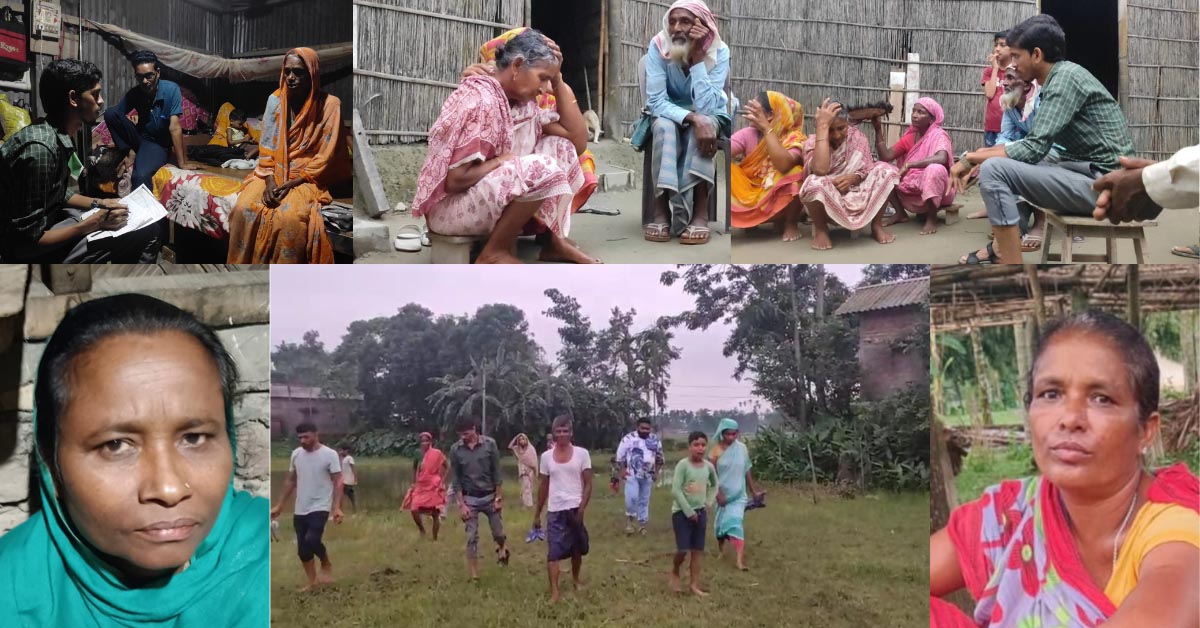What We Know So Far: June 3, 2025
It has been ten days of trauma and sleepless nights for thousands of working class citizens in the north eastern state of Assam. When the Assam Border Police, backed by no legal authority, no warrants, simply swept down on all 33 districts and selectively picked up women, women with babes in arms, men and illegally detained them before many of them were allegedly pushed across the international border into Bangladesh. CJP’s first exclusive report may be read here.
A week later, yesterday, Sunday June 1, some respite was felt, even as anger and trauma reigned. News and accounts of several such illegally detained citizens being “dumped back” in different locales in Assam, with no explanation trickled in. There is of course no talk, not a murmur even of reparation or compensation, for what they had been put through.
CJP’s team members met with and interviewed six such women. Whom fate had rescued. Dozens of those detained still remain untraceable, an approximate figure of those who were initially untraceable, as per unconfirmed reports is 145.
Hajera Khatun:
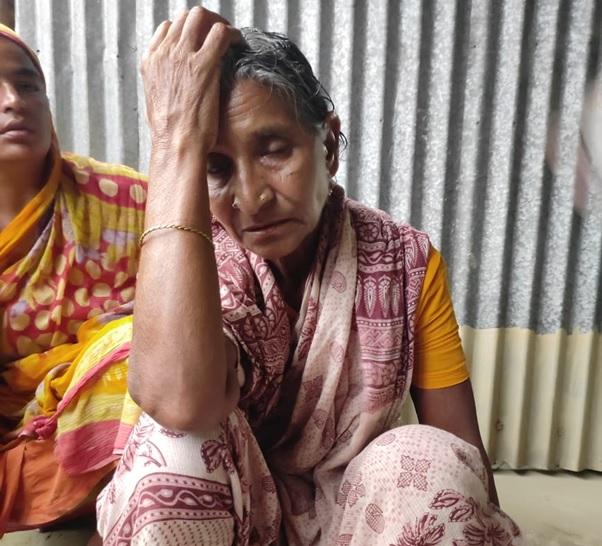
Over 60 years old, Hajera Khatun, is the daughter of Kurpan Ali, and wife of Sangser Ali from village Bhalluki under Barpeta road police Station of Barpeta District. This Bengali-speaking Muslim women who is a diabetic patient was allegedly forcefully and illegally detained by the Assam Border Police on May 25. She was taken to an entirely unknown place.
Hajera Khatun was not unfamiliar with being detained. She was once detained in one of Assam’s dreaded detention camps –women are kept at Kokhrajhar—and was released on temporary bail in 2021. Her case is pending in the Gauhati High Court and it is of significance that under directives of the Gauhati HC she could not have been deported. Yet she was. CJP has accessed a copy of her documents.
Like dozens of others from different parts of Assam, this poor Indian woman was taken away by the police on May 25. She was not found since. Her family members searched desperately for her for over a week, seeking assistance from CJP’s legal and paralegal team too. However she could not be traced. Finally, when she reached home on May 30 (Friday), CJP volunteers including CJP’s state-in-charge, Nanda Ghosh and advocate Abhijeet Choudhary met and interviewed her.
When the team first reached her home she was found to be ill due to high blood pressure and had been taken for medical assistance and treatment by her family members. After about an hour, Hajera share her pain, “The police simply came and told me –without giving reasons–to go to the office of the Superintendent of Police (SP) on May 25. I got terrified, and asked, ‘Why would I go to the SP office?”
She continued, “They took me away from here saying, ‘How many more days will you have to appear like this? It’s hard on you, and it’s hard on us too.’” They said they’d make some arrangement today so that you wouldn’t have to come (to report regular presence) anymore and that thereafter we wouldn’t have to do anything. That is only how and why I went with them.”
“From the office of the SP at Barpeta, —I’m not exactly sure—but there were three-four busloads of people. Later, they took only two buses and left two behind. So many people just did not want to go, but they were beaten and forced into the bus and the doors shut. Then, they took us to the Matia Detention Camp (in Goalpara district) (This is about 91 kilometres, about a three hour drive from Barpeta). We spent the whole day and night without food. The next day, around 10 am, we were still sitting in the bus. Then they took us out and gave us a little bit of rice, after some time. We were so frightened, we could not even eat properly. After that, we thought we’d be allowed to sit inside the room where we were, for a bit. As soon as we sat down, they called us again, saying they needed to take our photos. We went, leaving our bags and money in the room where we had sat, thinking we would reclaim them after the photo session. But, after taking photos, they closed the gate of the Detention Centre, again. Then they began herding us into the bus like cattle, and one person, a teacher amongst us was protesting loudly, asking why the women were being treated so harshly and why they were being subjected to such suffering. He was even trying to stop the women from being taken away like that. However, despite his efforts, we were still forced onto the bus by police. The teacher who was resisting and trying to intervene was brutally beaten in front of our eyes, his eyes were covered, and his hands were tied behind his back,” she fearfully described to us.
Hajera trembled, saying, “Khairul Master [Khairul Islam, the teacher] was beaten so severely that he lost consciousness.” She continued, “The (Assam Border Police) gave each of us a packet, which contained two notes of that country’s currency (Bangladeshi currency). Then we were taken to the border, they made us get off the bus and cross the border, it was so terrifying and horrible.”
“They told us, ‘don’t say a word, don’t talk “, Hajera cried as she recounted the pain of a week ago.
She stopped and then said, “We stood there, in that dreadful place all night, drenched in the rain, hungry, at the border.”
“In the morning, Bangladeshi people and police found us and they asked us why we Indians had entered Bangladesh. Then they brought us back to the BSF (Border Security Force), the police of the two countries talked all day, but no one was there for us, to speak for us. They just physically pushed us around. We just kept crying and weeping in fear being tossed between the borders of the two countries border (No Man’s Land). Just like this, the last few days have been spent in terror. Then, the police caught us and put us in a camp. The next morning, the police from both countries talked about us, but reached no agreement; no one agreed to take us!” Hajera added. “We don’t know how or why but suddenly we were driven back.”
Hajera’s son added, “Last night around 11 pm, that is the night of (May 31, Saturday) we received news that my mother (Hajera) and a woman named Sona Bhanu were both found on the Goalpara highway. I then called Jubbar bhai (local student leader, AAMSU) here, we took a car and rescued my mother. ”
Sona Bhanu:
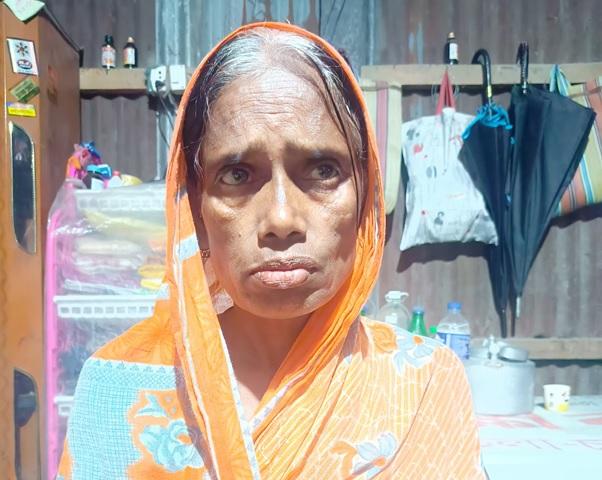
Sona Bhanu is a 59-year-old widow from Burikumar village in Barpeta district, who was similarly allegedly “taken away” by the Assam police on May 25 and went missing. She suddenly reappeared on the Goalpara highway around 11:30 pm on June 1. Sona Bhanu’s journey to this point has been marked by a long-standing dispute over her citizenship. In 2013, the Barpeta Foreigners’ Tribunal declared her a foreigner, a decision upheld by the Gauhati High Court in 2016. However, the Supreme Court intervened in 2018, staying the Gauhati high court’s order. CJP has accessed a copy of her documents.
Her younger brother, Asraf Ali, expressed his frustration with the CJP team; “We have all the necessary documents, including our presence recorded in the 1951 NRC. Our parents are Indian, and all of us siblings are Indian citizens. How can my sister be considered Bangladeshi?” He highlighted a potential case of mistaken identity, explaining that a notice from the border police was initially issued in the name of “Kamala Bhanu” but was later altered to “Sona Bhanu” without explanation.
Asraf Ali recounted Sona Bhanu’s ordeal; “The Barpeta Tribunal declared my sister a foreigner and confined her to the Kokrajhar detention camp. After spending 3 years, 3 months, and 13 days in detention, she was released on bail and has since been required to report to the local police station weekly.”
Sona Bhanu herself described the terrifying events that unfolded, her voice trembling with fear. She recounted being forced towards Bangladesh by the police or force, spending a harrowing night in No Man’s Land. “I was bitten by leeches and mosquitoes all night, and I got a fever from getting wet in the rain,” she said, adding, “We were afraid they would shoot us dead in the dark of night, who knows?”
As per Bhanu’s account, she was driven back to India as part of the same group of people as Khatun.
Rahima Begum:
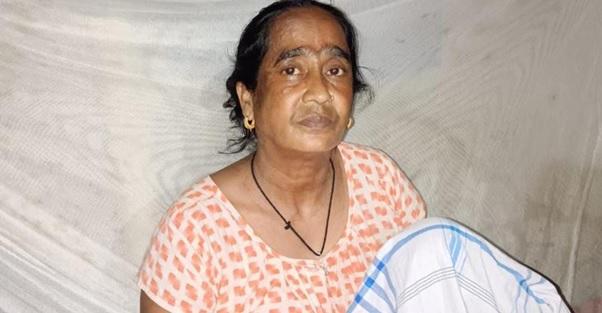
About 51 years old, Rahima, a Muslim women from the Padumoni village of Golaghat returned to her home from the No Man’s land between India and Bangladesh with the same batch of people, Hajera and Sona.
In a telephonic interview with team CJP, Rahima and her son Rakib Uddin Choudhury described the harrowing experience. Just like Sona and Hajera, Rahima was also pushed out to Bangladesh forcefully. Her son described her ordeal, “On 25 May the Assam Border Police told my mother to go to the police station to answer some questions. After spending the morning there, they took her to the Golaghat SP office. “He continued, “They then took my mother documents, and they collected fingerprints with those of some others.”
“My sisters and family members were there the whole day. But they were not allowed to meet my mother. Late night they took my Mother to Goalpara detention camp and then Border.”
Rahima’s son went on to describe the ordeal, “The Police who were with my mother and others, they gave them Bangladeshi notes (currency) and directed them to cross the border” Rahima added, “All we could see was paddy fields, mud and water. We just did not know what to do.”
She continued, “The others and I just walked between the paddy fields until we reached a village. But the people there chased us away and their border forces called us, beat us up a lot and told us to go back to where we came from.” Her son even claimed that his mother was subjected to violence by the Bangladeshi police.
Jahanara Begum-Ashifa Begum- Sahera Khatun:
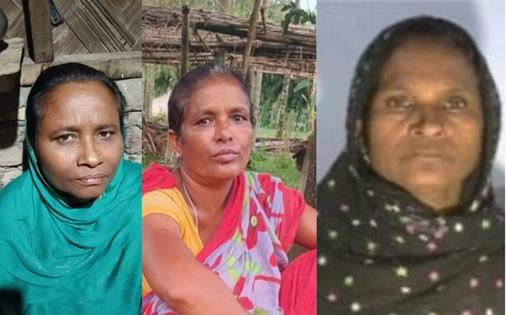
Jahanara Begum of Diring Pathar Village under Biswanath Charali police Station of Sonipur Police Station was detained by the Assam police on May 25 and was fortunate to be back home –after a traumatic experience –on May 29. On May 27 one of her family members even went to the Matia Detention Centre and there met team CJP (including Nanda Ghosh, Habibul Bepari, advocate Ashim Mubarak and advocate Dewan Abdur Rahim). When Jahanara fortuitously reached home, family members informed CJP.
In a telephonic interview with CJP, Jahanara was attempting to describe the unimaginable experience, even though she was quite unwell. She recounted that two other women, Ashifa Begum and Sahera Khatun of Dhekiajuli were also allegedly forced out of their homeland into ‘No Man’s Land’ before reaching back home. Their story is similar to Hajera and Shona’s account.
Unaccounted others: Also as per per Hajera and Sona Bhanu account to CJP, when they were “returned to Goalpara at night, there were five other men with them, meaning there were seven people in their group including Hajera and Sona. However they do not have any idea of their name or identity.
Meanwhile CJP has confirmed reports that Khairul Islam the teacher from Morigaon who was allegedly brutalised by the Assam Border Police at Matia Detention Centre was initially part of the group of 14 that had been pushed over into No Man’s Land but after that action the group was “divided” –by the Bangladeshi Security forces– into two parts of seven and seven and Khairul Islam was then in the other group. Rahima also told CJP that with her, one more woman had been brought back to Jorhat police station from no man’s land but she did not know her name.
With the level of unaccountability of the state authorities, human rights organisations and survivors have to use community methods to calculate the extent of the trauma.
Release from Matia detention camp:
Meawnhile, CJP team member, Zesmin Sultana has informed us that one similar victim of arbitrary detention, Rahim Ali back was sent back to his home in Goalapra District after being kept at the Matia Detention camp from May 29 and released on May 31, a detention period of two days. His identity is Rohim (Rahim) Ali, son of Dobiram Sangma, mother Jelmish Marak belonging to the Christian Garo trive from village Paikan pt-1, Krishnai.
Background of the Incident:
From the night of May 23, 2025, the Assam police initiated a widespread crackdown across all 33 districts, detaining approximately 300 individuals in many cases without notice or legal justification. Families and advocates were left uninformed about the detainees’ whereabouts, violating constitutional and legal norms. While around 150 were reportedly released, unconfirmed reports suggest 145 individuals—still fighting for their citizenship rights—were forcibly pushed across the border into ‘no man’s land’ between India and Bangladesh. These individuals include those declared foreigners by tribunals, those released on bail, even those litigating for restoration of citizenship. Notably, no formal deportation orders or bilateral repatriation agreements have been disclosed, leaving the affected families in uncertainty.
On one hand, many people are missing, and on the other hand, neither the police nor other administrative authorities are providing clarification to the families about the missing people who were taken away by the police.
Many victims’ families complain, saying they attempted to have an FIR registered at the police station but that the cops did not register one, following which they sent their complaint by post to the local SP
It is noteworthy that the CJP Assam team submitted this memorandum to the National Human Rights Commission, which was signed by the CJP Assam team members and legal team members and the chief convener of the Forum for Social Harmony.
Meanwhile, although there has been no major protest, there is anger among many people in Assam. There is also a lot of discussion among people about who issued the orders and why were Indian citizens –even those with contested citizenship– sent to Bangladesh in such a cloak and dagger fashion. If some of them were actually Bangladeshi, why were deportation norms as detailed by the union government in the recent Rajubala proceedings not followed? Why did Bangladesh then not accept them? Most critically, where are those who are still missing? And who will pay for the trauma and torture subjected on ordinary Indians?

